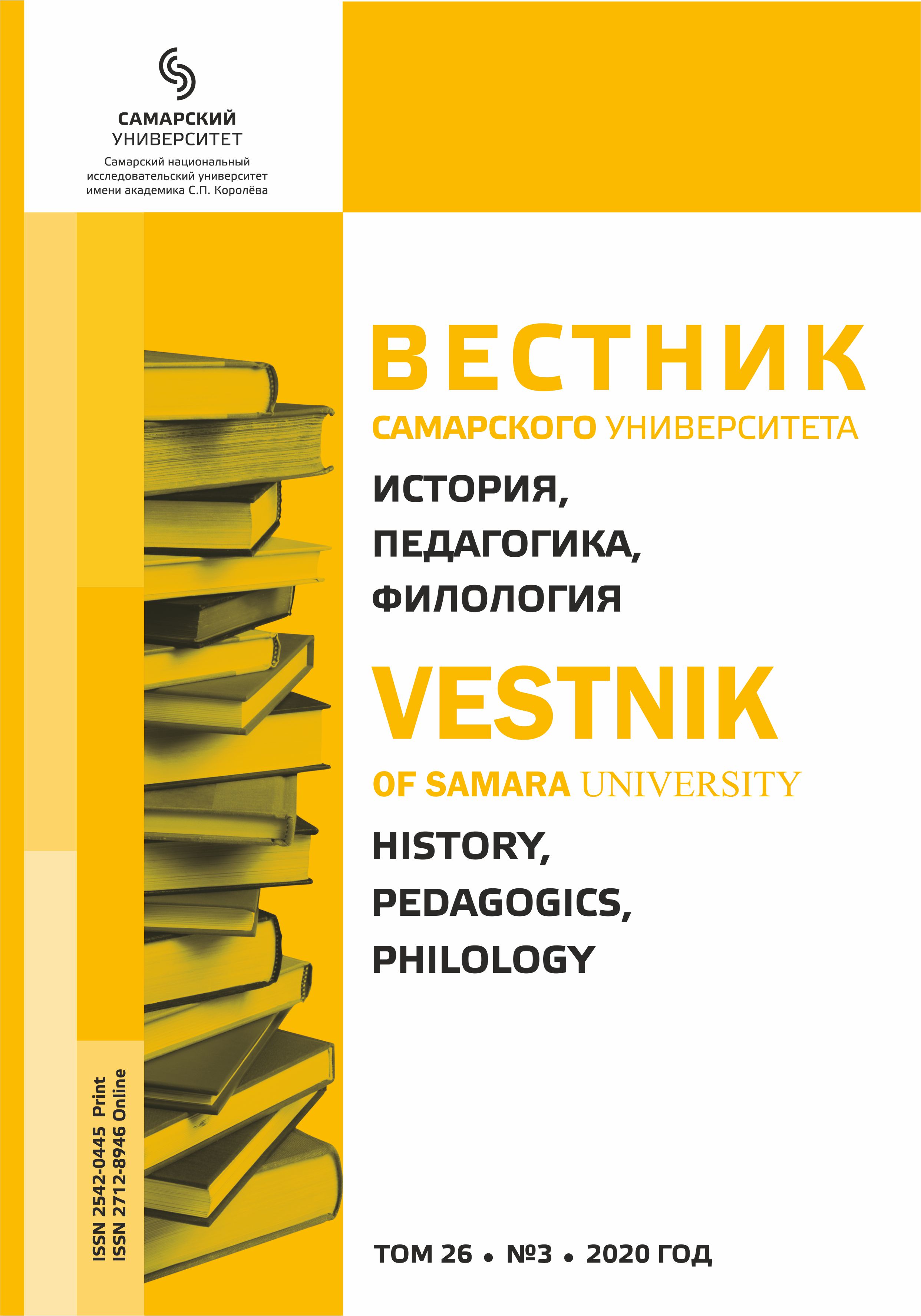Этнокультурный немецкий текст «Kalendergeschichte»: прототипические особенности композиционно-сюжетной организации текстовой структуры
- Авторы: Небеснюк У.А.1
-
Учреждения:
- Российский государственный педагогический университет имени А.И. Герцена, г. Санкт-Петербург, Российская Федерация
- Выпуск: Том 26, № 3 (2020)
- Страницы: 131-141
- Раздел: Статьи
- URL: https://journals.ssau.ru/hpp/article/view/8197
- DOI: https://doi.org/10.18287/2542-0445-2020-26-3-131-141
- ID: 8197
Цитировать
Полный текст
Аннотация
Для лингвистов XXIвека, занимающихся вопросами типологии текстов, особый интерес представляют типы текста, недостаточно изученные с лингвистических позиций. К ним можно отнести немецкоязычные «календарные истории», развившиеся из «календаря» как зарождающегося средства массовой информации в этнокультуре Германии. Занимательные историко-сатирические рассказы сентенционального характера вышли за рамки календаря в начале XIX века и образовали самостоятельный литературный жанр «календарная история» (нем. Kalendergeschichte). С целью выявления прототипических особенностей композиционно-структурной организации данного типа текста автором статьи проводится анализ календарных историй из сборника И.П. Хебеля «Сокровищница рейнского друга дома» (SchatzkästleindesrheinischenHausfreundes). В результате сквозного анализа текстов сборника установлено, что в основе «календарной истории» как особого типа этнокультурного немецкого текста лежит композиционно-речевая форма «повествование», лаконизм текстовой актуализации которой позволяет отнести исследуемый тип текста к малым эпическим жанрам. Литературно-художественный нарратив «календарной истории» отличается наличием единой сюжетной линии, четкой структурно-композиционной организацией текстового целого с прагматическим фокусированием трех «сильных позиций» текста – заглавия, начала и конца. Типичным для «сильной позиции» заголовка является сообщение информации об основном виде деятельности главного героя, характере сюжетного события и месте его действия. К основным видам композиционно-смыслового оформления начальных позиций «календарной истории» относятся, кроме того, экспозиция, авторская ремарка и завязка. Важную композиционную роль в этом типе текста играют анализируемые в статье три типа конечных позиций текста: пуанта, развязка после пуанты и морализаторская авторская ремарка, которая может представлять собой заключительный акт календарной истории, общий совет для практического применения, пространное рассуждение на морально-нравственную тему.
Об авторах
У. А. Небеснюк
Российский государственный педагогический университет имени А.И. Герцена, г. Санкт-Петербург, Российская Федерация
Автор, ответственный за переписку.
Email: morenov@ssau.ru
ORCID iD: 0000-0002-5389-2132
аспирант, кафедра немецкой филологии, Российский государственный педагогический университет имени А.И. Герцена
Список литературы
- Kilchenmann 1970 – Kilchenmann R.J. Rezept für die bösen Weiber: Kalendergeschichten von Grimmelshausen bis Brecht. Wuppertal-Barmen: P. Hammer Verlag, 1970. 208 S.
- Knopf 1983 – Knopf J. Die deutsche Kalendergeschichte. Ein Arbeitsbuch von Jan Knopf. Frankfurt am Main: Suhrkamp Verlag, 1983. 290 S.
- Rohner 1978 – Rohner L. Kalendergeschichte und Kalender. Wiesbaden: Akademische Verlagsgesellschaft Athenaion, 1978. 552 S.
- Андреева 2019 – Андреева В.А. Литературный нарратив: зона формирования смыслов. Казань: Бук, 2019. 320 с.
- Брандес 2004 – Брандес М.П. Стилистика текста. Москва: Прогресс-Традиция, ИНФРА-М, 2004. 416 с.
- Гальперин 2006 – Гальперин И.Р. Текст как объект лингвистического исследования. Москва: КомКнига, 2006. 144 с.
- Гончарова, Шишкина 2005 – Гончарова Е.А., Шишкина И.П. Интерпретация текста. Немецкий язык. Москва: Высшая школа, 2005. 365 с.
- Небеснюк 2019 – Небеснюк У.А. История развития календаря как кумулятивного текста массовой информации в этнокультуре Германии // Вестник Удмуртского университета. Серия История и филология. 2019. Т. 29, Вып. 6. С. 976–981. doi: 10.35634/2412-9534-2019-29-6-976-981.
- Шмид 2003 – Шмид В. Нарратология. Москва: Языки славянской культуры, 2003. 312 с.
Дополнительные файлы













